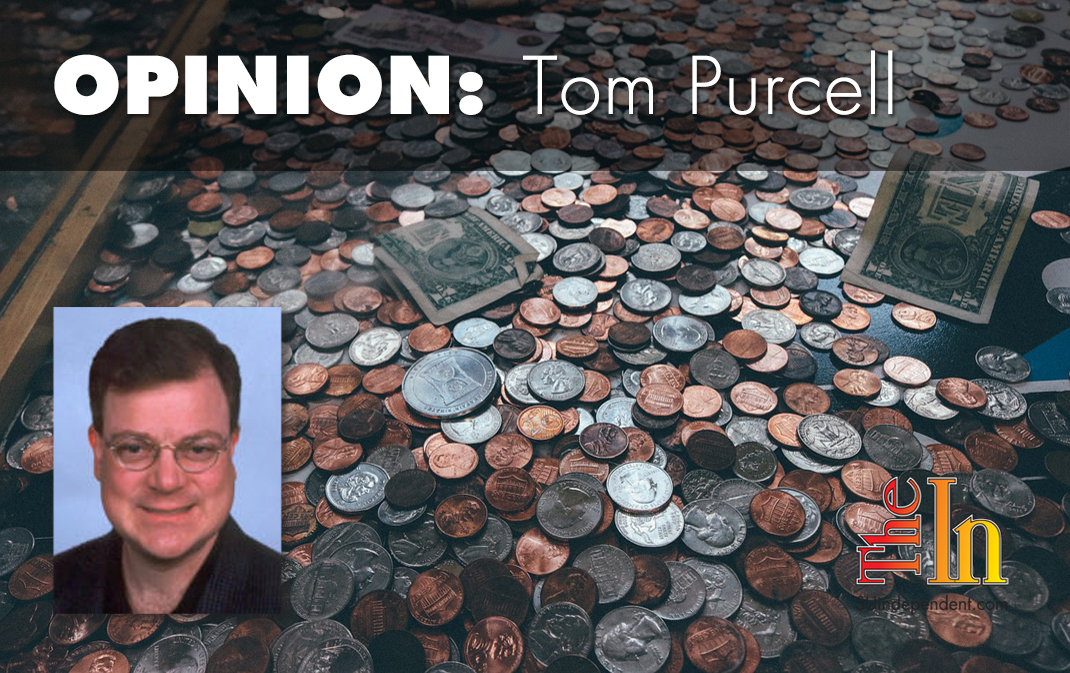
Donations to pay down U.S. debt pointless
By Tom Purcell
With America’s national debt surpassing a frightening $22 trillion, it makes sense that fewer people are volunteering their hard-earned dough to help reduce it.
Since 1961, the Bureau of the Public Debt has allowed Americans to “gift” money to the Treasury Department on the condition that the money be used only to pay down the debt.
Last year’s donations totaled about $775,000, “only the fourth time in 20 years that the fund didn’t reach at least $1 million in actual dollars,” says U.S. News & World Report.
“Over the last five years the amount of gifts to reduce public debt has shrunk substantially from about $5 million to under a million,” a Treasury spokesman told U.S. News.
Why the drop? Nobody’s certain. But I have a theory.
It isn’t related to politics. The pattern of annual donations, high and low, is nearly even during both Democratic and Republican administrations.
So who volunteers their money? And why do they even bother?
When I looked into this a decade ago, a Bureau of the Public Debt senior adviser (now retired) told me the donors she encountered seemed to be patriotic citizens wanting to do their small part to help their country.
She said most mailed checks without notes. Some signed tax-refund checks over to Treasury.
Occasionally, individuals left large portions of their estates to the government. The largest estate gift on record, $3.5 million, came in 1992.
The Congressional Research Service reports the largest single gift came in fiscal year 1994: $12 million from someone who remains anonymous.
“In total,” says U.S. News, “about $100 million has been donated since President John F. Kennedy signed the program into law in 1961.”
Regrettably, that’s a drop in the bucket and perhaps the reason donations are dropping.
In 2014, Americans donated $5.1 million. That fell to $3.8 million in 2015, $2.7 million in 2016, $2.6 million in 2017 and $775,000 in 2018. Only $185,000 has been donated so far in 2019, despite a roaring economy.
Perhaps donations are down because government spending has long been out of control regardless of which party is in charge.
Perhaps donations are down because they are, essentially, useless.
Say the national debt stopped growing at $22 trillion (quit laughing!). Say that for the rest of time our government would never spend a penny more than it takes in.
And say well meaning Americans then gifted $5 million every year to pay down that $22 trillion with zero interest on that debt.
Even then, it still would take 4.4 million years to reduce the debt to zero.
What’s worse is that these donations technically aren’t paying down the debt anyhow. The donations are recorded on the receipts ledger of the federal government’s general fund.
So rather than actually paying down the national debt, these donations just reduce the amount of money our government will borrow as it continues to run massive annual deficits.
That’s why, in my humble opinion, fewer good-hearted Americans see any point in gifting their hard-earned money to our spendthrift government. No matter how much patriotic citizens want to do their part, and no matter how much they donate, it won’t make a real difference.
They know that. And they know that so long as our politicians remain unserious about reducing spending and deficits, the national debt will continue to explode.
It’s no wonder why fewer Americans are willing to throw good money after bad.
The viewpoints expressed above are those of the author and do not necessarily reflect those of The Independent.
How to submit an article, guest opinion piece, or letter to the editor to The Independent
Do you have something to say? Want your voice to be heard by thousands of readers? Send The Independent your letter to the editor or guest opinion piece. All submissions will be considered for publication by our editorial staff. If your letter or editorial is accepted, it will run on suindependent.com, and we’ll promote it through all of our social media channels. We may even decide to include it in our monthly print edition. Just follow our simple submission guidelines and make your voice heard:
—Submissions should be between 300 and 1,500 words.
—Submissions must be sent to editor@infowest.com as a .doc, .docx, .txt, or .rtf file.
—The subject line of the email containing your submission should read “Letter to the editor.”
—Attach your name to both the email and the document file (we don’t run anonymous letters).
—If you have a photo or image you’d like us to use and it’s in .jpg format, at least 1200 X 754 pixels large, and your intellectual property (you own the copyright), feel free to attach it as well, though we reserve the right to choose a different image.
—If you are on Twitter and would like a shout-out when your piece or letter is published, include that in your correspondence and we’ll give you a mention at the time of publication.
Articles related to “Donations to pay down U.S. debt pointless”
Letter to the editor: The Robin Hood agenda — what we could do with a national wealth tax



